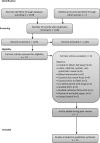Coconut oil consumption and cardiovascular risk factors in humans
- PMID: 26946252
- PMCID: PMC4892314
- DOI: 10.1093/nutrit/nuw002
Coconut oil consumption and cardiovascular risk factors in humans
Abstract
Coconut oil is being heavily promoted as a healthy oil, with benefits that include support of heart health. To assess the merits of this claim, the literature on the effect of coconut consumption on cardiovascular risk factors and outcomes in humans was reviewed. Twenty-one research papers were identified for inclusion in the review: 8 clinical trials and 13 observational studies. The majority examined the effect of coconut oil or coconut products on serum lipid profiles. Coconut oil generally raised total and low-density lipoprotein cholesterol to a greater extent than cis unsaturated plant oils, but to a lesser extent than butter. The effect of coconut consumption on the ratio of total cholesterol to high-density lipoprotein cholesterol was often not examined. Observational evidence suggests that consumption of coconut flesh or squeezed coconut in the context of traditional dietary patterns does not lead to adverse cardiovascular outcomes. However, due to large differences in dietary and lifestyle patterns, these findings cannot be applied to a typical Western diet. Overall, the weight of the evidence from intervention studies to date suggests that replacing coconut oil with cis unsaturated fats would alter blood lipid profiles in a manner consistent with a reduction in risk factors for cardiovascular disease.
Keywords: cardiovascular disease; cholesterol; coconut; lauric acid; medium-chain triglycerides.
© The Author(s) 2016. Published by Oxford University Press on behalf of the International Life Sciences Institute. All rights reserved. For Permissions, please e-mail: journals.permissions@oup.com.
Figures
References
-
- Eyres L. Handbook of Australasian Edible Oils. Auckland: Oils and Fats Specialist Group of the New Zealand Institute of Chemistry; 2007.
-
- Marina A, Che-Man Y, Nazimah S, et al. Chemical properties of virgin coconut oil. J Am Oil Chem Soc. 2009;86:301–307.
-
- Gunstone F. Lauric oils. Lipid Technol. 2010;22:168 doi:10.1002/lite.201000035.
-
- Srivastava S, Singh M, George J, et al. Genotoxic and carcinogenic risks associated with the dietary consumption of repeatedly heated coconut oil. Br J Nutr. 2010;104:1343–1352. - PubMed
-
- Sivakumaran S, Huffman L. The Concise New Zealand Food Composition Tables. 11th ed. Palmerston North, New Zealand: New Zealand Institute for Plant and Food Research Limited and Ministry of Health New Zealand; 2014.
Publication types
MeSH terms
Substances
LinkOut - more resources
Full Text Sources
Other Literature Sources
Medical


